debate about blockchain scalability: Solana founder Anatoly Yakovenko rejects Layer 2 solutions and relies on layer 1 efficiency
<p> <strong> debate about blockchain scalability: Solana founder Anatoly Yakovenko rejects Layer 2 solutions and relies on layer 1 efficiency </strong> </p>
Solana founder Anatoly Yakovenko speaks against Layer 2 solutions
Anatoly Yakovenko, co-founder of Solana, has initiated a controversial debate about the scalability of blockchain technologies by rejecting the need for layer 2 solutions (L2), as propagated by Ethereum. These statements fall into the context of major discussions about L2 networks and their role in the industry.
Solana founder sees no reason for Ethereum Layer 2
yakovenko reacted to statements by Ethereum developers Rip.eth, who argued that L2 solutions are naturally faster, cheaper and safer alternatives to layer-1 (L1) blockchains. According to Rip.eth, L2S can handle high costs and consensus risks associated with the management of a full -fledged L1. He gave the example of Eclipse, an L2 based on the Solana Virtual Machine (SVM), which uses the security of Ethereum and could thus offer the best of both worlds: the speed of Solana combined with the decentralized security of Ethereum.
However,yakovenko rejected these arguments and emphasized that Solanas L1 already offers sufficient scalability without an L2 being required. He stated that L1S could achieve efficiency without having to accept the complexity of L2 solutions.
"There is no reason to build an L2. L1s can be faster, cheaper and safer," said Yakovenko. He pointed out that L2S would always have to make a compromise because they rely on the infrastructure of L1, which raises additional security concerns.
In the course of the discussion, a user, Marty McFly, expressed concerns about the long-term scalability of blockchains and the question of what happens when the amount of data stored on the chain grows exponentially. Yakovenko replied that Solana currently generates about 80 terabytes of data per year, which is rather small in the business context, but was large for individual storage. Alan, a supporter of decentralization, questioned the approach of Solana for the administration of unused memory, especially since the State Rent mechanism is currently inactive.
"What is Solana's plan to outsource unused memory because the current state-rent mechanism is not activated?" Asked Alan. Yakovenko then explained that Solanas Ledger is saved on decentralized solutions such as Filecoin (Fil) and that the outsourcing of historical blockchain data to external memory providers is part of Solana's long-term plan.
moving trends in the Layer 2 adoption
yakovenko's rejection of L2S comes at a time when Ethereum goes through significant changes in its transaction fee model. Reports show a decline in the transaction sales generated on Ethereum, which indicates that the L2 adoption has contributed to reducing the costs for users. This development questions the idea that L1 blockchains alone can meet all scalability requirements, especially in the context of Ethereum.
In addition, the founder of Binance, Changpeng Zhao, recently brought up the debate whether AI projects should be built on L1 or L2 solutions. This discussion reflects the arguments of Yakovenko and Rip.eth and illustrates the continued division in the industry where future blockchain-based AI applications should be positioned.
Ethereum co-founder Vitalik Buterin also commented on the long-term sustainability of L2S. Six months ago, he predicted that some L2 networks would fail because many projects are not sustainable due to economic and safety-related restrictions. Nevertheless, a roadmap for scaling the Ethereum L1 and L2 protocols in 2025 and recognized that both layers will make a contribution to ethereum growth only two months ago.
"We still have to expand the technical and social properties and the benefits of Ethereum," wrote butterin.
Yakovenko's clear attitude against L2S illustrates the growing divergence in the strategies for scaling blockchains. While Solana focuses on maximizing the L1 scalability, Ethereum follows a more balanced approach by further developing both L1 and L2 solutions.


Kommentare (0)